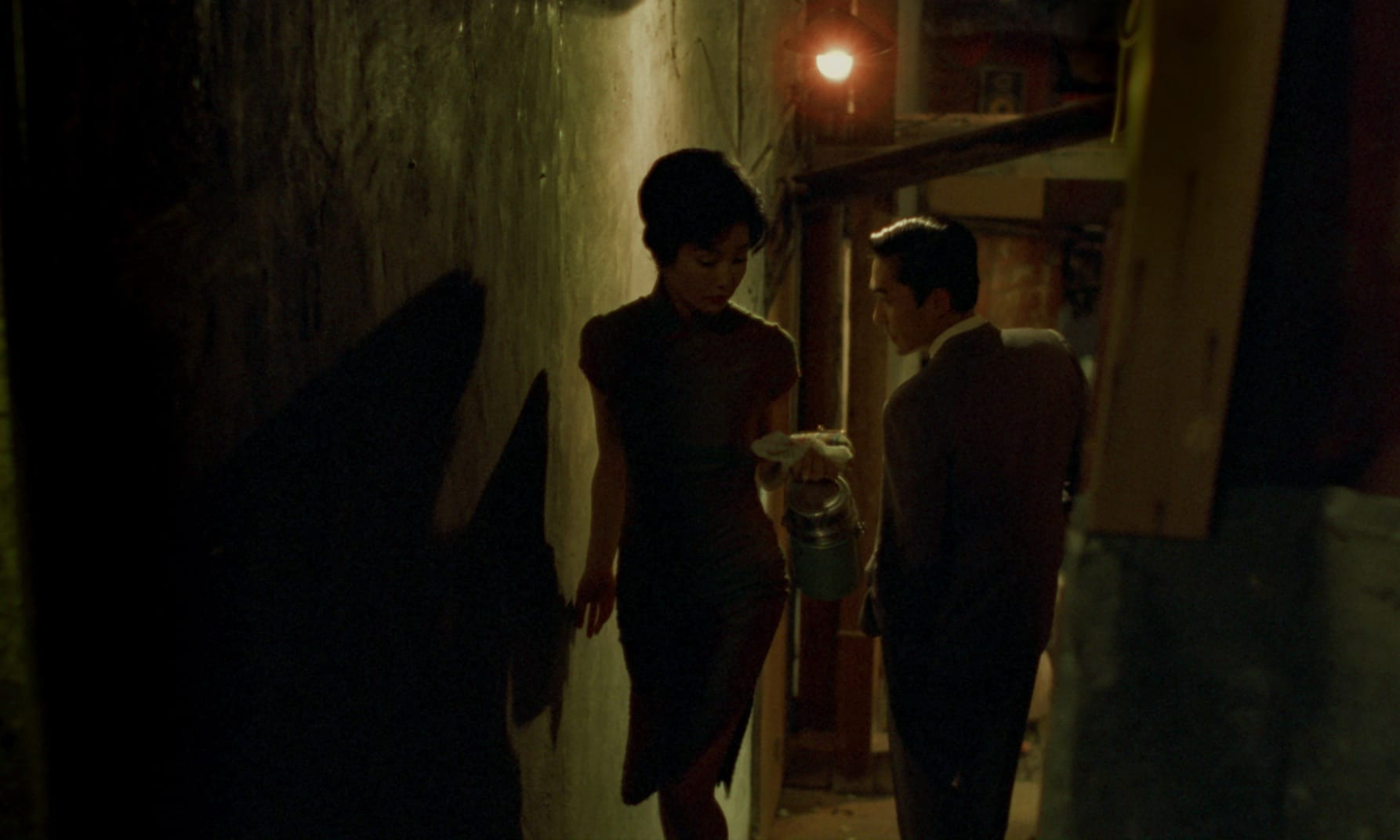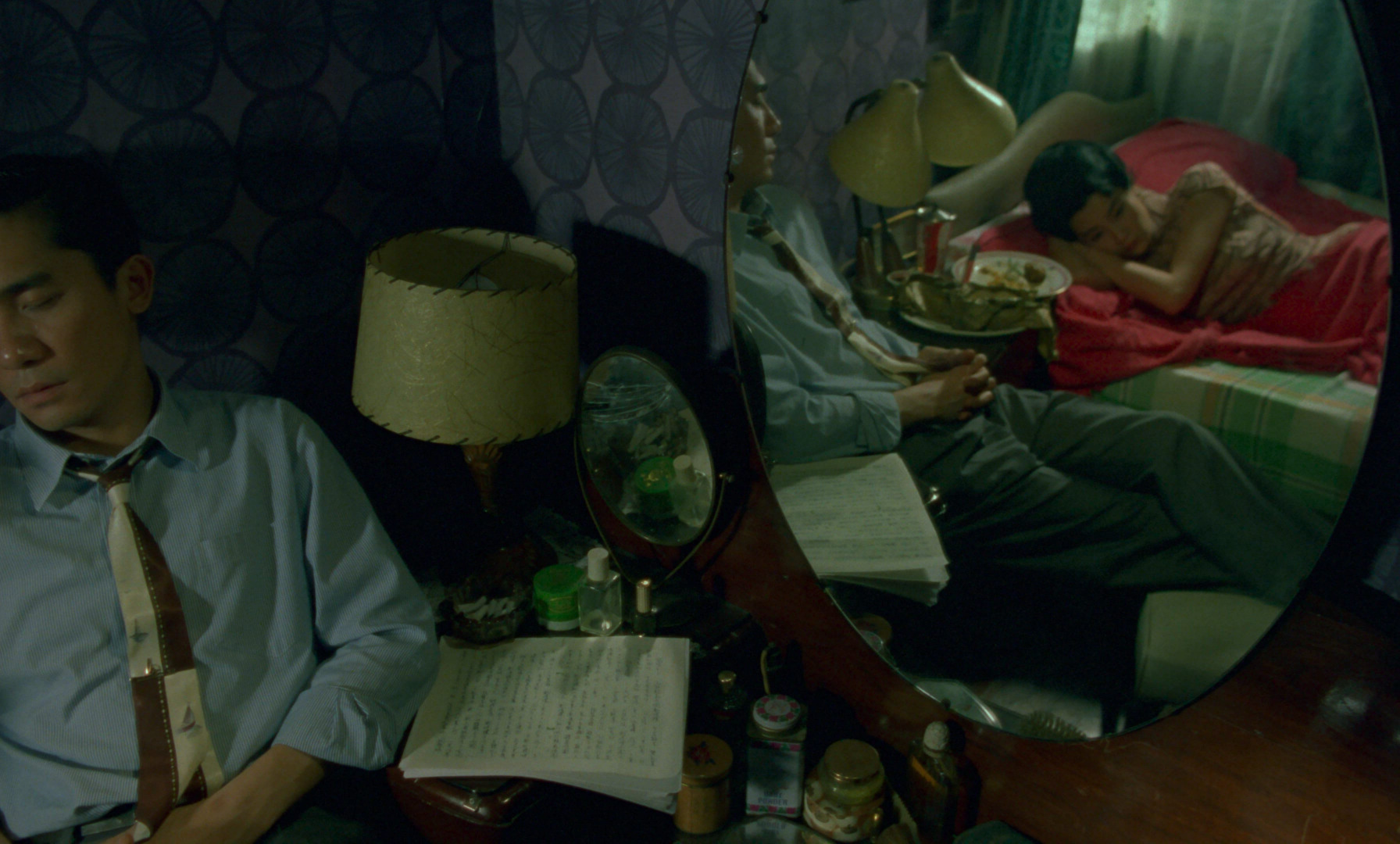RELATED ARTICLE

1.
“Yumeji’s Theme,” the pizzicato. Raindrops, maybe. Or footsteps. Someone nearby, in the hall. Moments plucked. Time passing, a clock ticking. Heartbeats.
Pizzicato and then the legato, violin liquid and flowing, spilling over the hours and minutes and seconds in between. The melodic line trying to find its way, lifting up briefly, an expression of desire, to be free. Straining against whatever holds it back and then returning downward, diminished. All the while, the pizzicato. Regular. Metronomic.
2.
The run time is listed as ninety-eight minutes. It feels longer.
3.
Moments distilled to their essence. Time slowed or even stopped. In between, weeks or months pass, marked by signs of the changing seasons. By books borrowed, read, and returned. Time moving in circles. Jumping ahead, looping back.
All of this the result of a long production—over a year of shooting and waiting and rethinking, looping back. Different versions explored. Outtakes. A live chicken. Singing. Sleeping together. All of that gone. The result achieved through subtraction, distillation. Absences and silences, what isn’t said or seen. The other side of the phone call, the other side of the doorway. The moments that slip away.
4.
What’s stopping them? What’s holding them back?
5.
Maggie Cheung Man Yuk as Mrs. Chan.
Standing there, waiting for noodles. Preposterous. The upswept hair, the high collar of the cheongsam. Impossibly glamorous. A woman out of place, out of tempo. Alone in the frame, people bustling around her, she waits for her noodles, dabs at her forehead. In repose, in the length of lines, the illusion of motion even as she holds still. A contradiction. Impossibly graceful.

6.
Tony Leung Chiu Wai as Mr. Chow. The sheen on his jet-black hair. The suits, hanging off his slender frame, the pocket square folded and tucked. His eyes doing all the talking. Breaking into a slow smile, a smile that takes its time, moves from lips to eyes to temples and then back to the mouth, where it seems to soften and then turn into something else. The saddest smiles.

7.
The first time I watched In the Mood for Love was more than twenty years ago. It was early 2001, a cold spring afternoon in New York City. I took the 1/9 train downtown from Columbia and watched it by myself.
Afterward, back uptown, I ate alone at the noodle shop on the corner across from campus. I ordered a bowl of noodles and a bottle of beer and took an hour to eat and drink them. Moving slowly, outside and inside, as if I were in syrup. People in the restaurant were looking at me funny, like I was on something. I was twenty-five.
Watching the movie now, at forty-six, I think back to the brief time I lived in New York. I met my wife there. I didn’t know we would end up together. Those years still feel fresh. But also impossibly far, a different lifetime.
8.
“Yumeji’s Theme.” Going down the stairs, back up. Turning the corner. Mrs. Chan, holding the green container for noodles and soup. Mr. Chow, a newspaper tucked under his arm.
Passing, he turns to her. No eye contact, not yet, but something passing between them. Do they feel it? Who will show it first?

9.
The economy of the writing. Every line working double, triple duty. Playacting as each other’s spouses at first. Inhabiting their roles, trying to imagine how it could have started, what had happened. Hiding behind their characters, talking to each other undercover.
By the way, I haven’t seen your husband lately.
He’s abroad now on company business.
That’s why I see you at the noodle stall.
She looks up, smiles.
He pays attention. You can learn a lot if you pay attention.
I haven’t seen your wife lately either.
Her mother’s ill. She’s at home with her.
That explains it.
Already writing a story together. Telling it to each other.
Why did you call me at the office today?
I had nothing to do. I wanted to hear your voice.
You have my husband down pat. He’s a real sweet talker.
He snuck that one in there. Got away with it.
As they chew, Nat King Cole. The first moments of: Oh. What is this? What’s happening?
Is he in character? Is she? Lines doing double duty. Triple. The look she gives him. The look he gives back. The tentative first steps, as they inch their way into their roles. Glimmers of recognition. Something stirring.
10.
Perfect moments:
Mr. Chow putting the hot mustard on her plate. Mrs. Chan dabbing her bit of steak in it.
Do you like it hot?
Your wife likes hot dishes.
The moment she slaps him—grazes him, really—the perfect reaction from Tony Leung. Deadpan, dead serious.
11.
A few minutes into the film, as Mr. Chow and Mrs. Chan are each moving into the same building, a shot of apples. A painting on a wall of apples in a shallow basket. Below the painting, on a plate, actual apples. Above the painting, a lamp fixture, pointing up. Down toward the apples in the flesh, a desk lamp, similar in shape, pointed downward, right at the apples. The lamp pointed down at the apples, as if a spotlight. The lamp is off, but the paint on the wall is chipped away, missing in a pattern—the absence of paint as a cone of light. Fruit and paint. Light and paint. Surface and depth. Thing and image. Reality and pretend.
12.
The symmetries. Two couples, each renting a room. Moving in the same day, one’s stuff confused for the other’s. Passing in the hall, squeezing by each other at the mahjong table. Ties and rice cookers and purses. Paying attention to the details. Just missing each other. Missed phone calls.

13.
Again: What’s stopping them? Gossip? The eyes of the neighbors. Hence the enclosures, the frames, the rooms they’re always trapped in, the windows and bars through which we see them.
What’s stopping them? But of course, that’s the wrong question. We know the answer. We won’t be like them, they promise. Promise themselves, and each other.
14.
Colors shifting. Greens, early on. Pale green, institutional (her office) or faded. An envious green.
Red and green everywhere, occupying the same space in different arrangements, varying proportions. The taxi they share: red and green. Trapped in Mr. Chow’s room, the green curtain, Mrs. Chan wrapping herself in the red blanket on the bed. The courtyard where they first walk—greens. Green-tinged light, Mr. Chow smoking by himself, knowing his wife is lying to him. The green noodle container Mrs. Chan carries, like a weight, like a burden.
15.
Then: the realization. Their spouses in Japan together.
What do you think they’re doing right now?
Maggie Cheung in the red coat. Rushing up the stairs, breathless. She goes to the room. We don’t see, but we infer: They won’t be like their spouses. They told themselves.
But the colors tell a different story.
Green not present in this scene. Mrs. Chan in a red coat. A red of roses, of apples, of blood. Behind her, the wall covered in more red. A bright, vivid, saturated red.
The shot we’ve seen already: her looking into a doorway. But this time, she’s not alone. Mr. Chow is visible in the shot as well, halfway out. They talk softly, with care for each other. They’re shot from afar. A feeling of being watched, maybe, but also one of distance.
This moment one they’ll remember. This moment now, to be longed for in the future. To be remembered, as if through glass. If only they could grasp it.
From this distance, it’s them but also maybe not them. Another couple—the one they said they wouldn’t be.
Mrs. Chan leaves, walks down the hall. Near the end, she stops, as if frozen. Holds this moment. As if to try to grasp it, to stop time. This moment in the prime of their lives.
Their laugh together, seen through red lace curtains. Even the green of her cheongsam has changed. The green of her cheongsam, a different one. Not the green of envy but the green of shoots, the first color of spring, the bright green of new growth.
We won’t be like them.
16.
But the shot tells a different story.
Mr. Chow and Mrs. Chan on the phone, now hidden, faces offscreen, just voices, like their spouses. They have become them.
And then Mrs. Suen lectures her. Maggie Cheung in the hallway, trapped in the frame, shadows framing her. Trapped in the drab office green, red color draining away. The affair ending just as it was beginning.
The evidence was there from the start. They were never free, always boxed in. Walking through the courtyard, shot through the bars as if imprisoned. All of their spaces occluded: hallways and doorways and staircases. Frames within frames. Spaces in which secrets are kept, spaces in which secrets are revealed.
The affair doomed before it even began.

17.
Grace notes: A globe in Mrs. Chan’s office, turned in such a way, the light hitting it in such a way, that it displays a faraway continent, South America.
Across the ocean, a foreign land where a forbidden love might flourish, where a doomed couple might be happy together.
Another small globe, this one on Mr. Chow’s desk. Turned to the same continent.
A very intentional span of time: 1962–66. Reminders of the larger world out there.
Rice cookers from Japan. The future is coming; the future is here. This present moment already slipping from them.
And then a different time and place. Nineteen sixty-two has become 1966. From Hong Kong, Mr. Chow now in Cambodia, filling a hole with a secret, packing it tight with wet earth, grass, and mud. Whatever secrets, whatever chance they had, sealed off forever. Those years sealed off.
18.
Rewatching the movie, we start the song again; we can move again from the greens to the deep reds. We can be on the stairs, in the hallway, in the café, in the room. Going around the loop, pretending, but it always ends the same way, those years at a distance, beyond our grasp.
19.
For relief, we look to the outtakes.
The one of them dancing.
Maggie Cheung and Tony Leung with real smiles. Having fun.
A feeling of surprise and recognition: they’re humans. People with families and lives outside of the dream of this film. The spell breaks momentarily. And then it returns, stronger. These actors, along with editors and cinematographers and designers and hair and makeup artists and, of course, Wong Kar Wai, they made this. It didn’t drop fully formed from story heaven. It hasn’t existed for all time, a memory box, a glass box of memory on a shelf in a locked room on an island in the ocean of the past. This was constructed. Which makes it all the more impressive.
20.
Maggie Cheung and Tony Leung, under an awning, waiting for the rain to pass.
More: Essays

I Am Cuba: The Filmmakers Who Came In from the Cold
With its delirious images and audaciously poetic style, Soviet filmmaker Mikhail Kalatozov’s hymn to revolution moves beyond ordinary logic to capture the mysterious beauty of collective utopia.

Werckmeister Harmonies: Dark Side of the Earth
Unfolding in elaborately choreographed long takes, this sublime adaptation of László Krasznahorkai’s novel The Melancholy of Resistance captures the weight of time and the mood of fascism with a haunting palpability.

Saint Omer: Shades of Motherhood
In her first fiction film, director Alice Diop brings the skills of observation she has learned from her documentary work to a thought-provoking exploration of race, power, and motherhood.

To Die For: You’re Not Anybody in America Unless You’re on TV
In Gus Van Sant’s wickedly funny tale of suburban depravity, Nicole Kidman plays a vacuous weather reporter whose hunger for fame anticipates our own era of digital celebrity.

